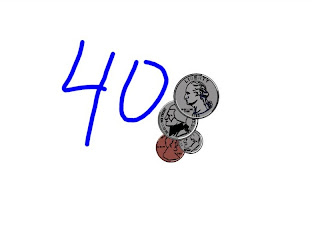There are some significant numbers in the Bible, so it might be a good idea to list a few of them. They tend to appear from time to time, like the number 14 for David. Most of them are more common than that one, though, so we'll run through a quick list of important numbers.
Three is a number that is usually associated with God or heaven or spiritual things. Some important three's would include the 3 person of God in the Trinity and Jesus being in the tomb for three days.
Four, on the other had, is a very earthly number. There are four directions (north, east, south, west), four seasons (spring, summer, fall, winter), four hemispheres, and four ancient elements (earth, wind, fire, water). This brings significance to Jesus' heavenly resurrection (three days in the tomb) compared to Lazarus' earthly resurrection (four days in the tomb).
When you add three and four, you get the complete number 7. Seven shows up a lot in the book of Revelation symbolizing completeness. A week is complete with seven days, like the seven days of creation. When Revelation was sent to the seven churches, it could be argued that it was sent to all the churches, the 'complete' number of churches.
One less than complete would be the devil's number of 6. The devil tries to imitate God's completeness, but comes up short.
10 is a number that represents power. Numbers are often multiplied by powers of ten. The beast in Revelation having 10 horns is a symbol of power.
The church is represented by the number 12. The people of God in the Old Testament were the twelve tribes of Israel. The people of God in the New Testament followed the teachings of the twelve disciples. All the people of God surround God's throne, represented by the twenty-four elders (12 + 12).
And 40 is a number for change. The earth was changed in the forty days it rained during Noah's time. The Israelites were changed during forty years of wandering in the desert. Moses was changed after spending forty days on the mountain with God. Jesus was changed during his temptations in the desert, being prepared for ministry. As a side note, it is also interesting the change that happened from 1968 when Martin Luther King Jr. was assassinated to 2008 when our first African-American president was elected - 40 years.

















